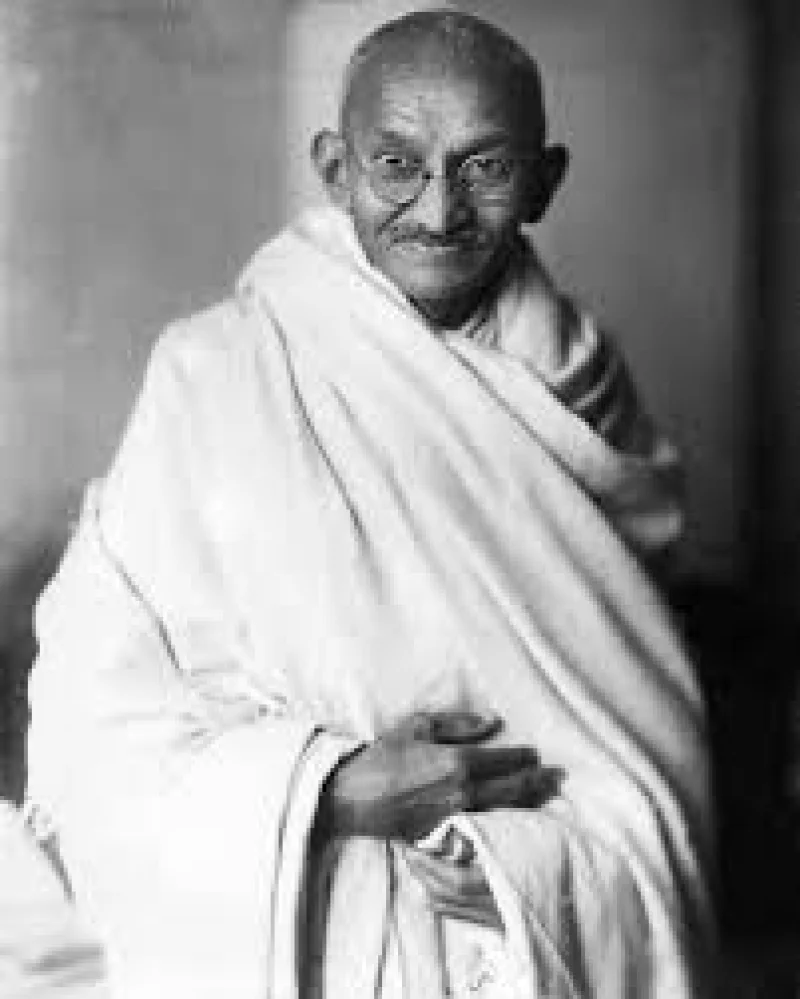Short Summary
Mohandas Karamchand Gandhi, widely known as Mahatma Gandhi, was a prominent leader in India's struggle for independence from British rule. He is famous for pioneering the philosophy of nonviolent resistance, which became a powerful tool for civil rights movements worldwide. His leadership in campaigns like the Salt March and Quit India Movement was instrumental in mobilizing the Indian populace towards the goal of self-rule. Gandhi's teachings on peace and nonviolence continue to inspire global movements for justice and equality.
Early Life & Education
Gandhi was born on October 2, 1869, in Porbandar, a coastal town in present-day Gujarat, India. He hailed from a Hindu merchant caste family; his father, Karamchand Gandhi, was the diwan of Porbandar. Gandhi married Kasturba Makhanji at the age of 13 in an arranged marriage. He pursued his early education in India before traveling to London in 1888 to study law at the Inner Temple. His time in England exposed him to various philosophical and social ideals, laying the foundation for his later ideologies.
Career Highlights
Upon returning to India in 1891, Gandhi struggled to establish a law practice. In 1893, he accepted a contract to work in South Africa, where he spent 21 years. It was here that he faced racial discrimination, which influenced his development of nonviolent resistance. He led successful campaigns against oppressive laws in South Africa before returning to India in 1915. In India, he became a leader of the Indian National Congress, directing nationwide campaigns for easing poverty, expanding women's rights, building religious harmony, and achieving Swaraj, or self-rule.
Major Achievements
- Championed the Non-Cooperation Movement, urging Indians to boycott British institutions and goods.
- Led the Dandi Salt March in 1930, a pivotal act of civil disobedience against the British salt tax.
- Played a key role in the Quit India Movement in 1942, demanding an end to British rule in India.
- Promoted the philosophy of Satyagraha, advocating for nonviolent resistance to injustice.
- Influenced the drafting of India's post-independence constitution emphasizing civil liberties and equality.
Famous Quotes
- "Be the change that you wish to see in the world."
- "The best way to find yourself is to lose yourself in the service of others."
- "An eye for an eye makes the whole world blind."
Interesting Facts
- Gandhi was nominated for the Nobel Peace Prize five times but never won.
- He walked approximately 240 miles during the Salt March to the Arabian Sea.
- Gandhi was a prolific writer, with his collected works spanning over 50,000 pages.
- His birthday, October 2, is celebrated as the International Day of Non-Violence.
- He was assassinated on January 30, 1948, by Nathuram Godse, a Hindu nationalist.
Legacy / Influence
Gandhi's legacy endures through his principles of nonviolence and peaceful protest, which have influenced leaders and movements worldwide, including Martin Luther King Jr., Nelson Mandela, and Cesar Chavez. His teachings continue to resonate in global struggles for civil rights, social justice, and political freedom. The principles he espoused remain relevant in contemporary discourse on conflict resolution and human rights advocacy.
FAQ
Q: Why is this person famous?
A: Gandhi is famous for leading India's independence movement against British rule and developing the philosophy of nonviolent resistance.
Q: What major movements did he lead?
A: He led the Non-Cooperation Movement, Salt March, and Quit India Movement.
Q: What is Satyagraha?
A: Satyagraha is the principle of nonviolent resistance to tyranny through civil disobedience.
Q: How is his birthday commemorated?
A: October 2 is commemorated as the International Day of Non-Violence.








